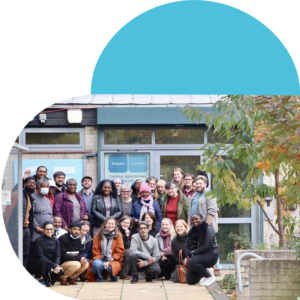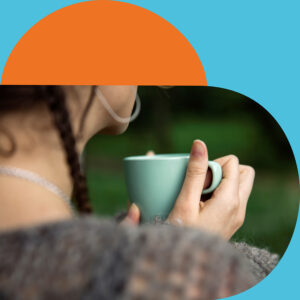
Our priority outcome: To reduce the number of people reaching crisis point and give prompt and appropriate support to people in crisis.
We can’t always prevent someone who’s getting mental health support from suffering a crisis, but the Alliance is developing new ways to help.

Context and key challenges
Too often, someone in a mental health crisis ends up in Accident and Emergency (A&E) or gets into a situation where they’re detained under the Mental Health Act for the safety of themselves or others. Arguably, any crisis indicates a failure of the system to support a person fully.
Following the pandemic and, more recently the cost-of-living crisis, we’re seeing an increased demand for our support.
As the chart below shows, 2022/23 saw a 20% increase in the number of referrals from St Thomas’s Hospital A&E compared with the pre-pandemic year of 2019/20, a 50% increase since 2018/19. Similarly, the second chart shows a 25% increase in the number of introductions (new referrals) to our Single Point of Access over a similar period.
What we offer
Care plans.
Our employees make sure that people who are already receiving mental health support have a care plan. This is a detailed document shared amongst the staff who support them and includes how to spot and what to do if they’re going into crisis.
Community based outreach Service.
Our community-based Crisis Outreach Service (COS) provides rapid face-to-face clinical assessments for people not currently receiving mental health support. People are usually referred to them by our Single Point of Access, but also by GPs, A&E and other healthcare colleagues.
Treehouse supported accommodation.
Our Treehouse supported accommodation provides 24/7 care for people who would otherwise be stuck in an acute hospital bed. This helps them to recover and be well enough to move on and live in more independent housing.
24-Hour Mental Health Support Line
The South London and Maudsley 24-Hour Mental Health Support Line is a resource for anyone needing advice, help and assistance with their own mental health or the mental health of someone they support.
Freephone: 0800 731 286.
Solidarity in a Crisis’ peer support line
This helpline is staffed by people with lived experience of mental health issues and operates out of hours.
Freephone: 0300 123 1922
www.certitude.london/what-we-do-2/solidarity-in-a-crisis
Evening Sanctuary
Mosaic Clubhouse’s Evening Sanctuary is a friendly, informal space that helps people who might otherwise attend A&E.
www.mosaic-clubhouse.org/sanctuary
Our impact
Crisis Outreach Service
The Crisis Outreach Service received 145 new referrals in 2022/23.
Tree House (24-7 supported housing)
The Treehouse saved 2,066 days in an acute bed in 2022/23, worth over £1 million, whilst supporting 79 people to live more independently
Evening sanctuary
The Evening Sanctuary, had 1,114 attendances from 210 people in 2022/23. 681 of these Evening Sanctuary attendances specifically avoided an A&E attendance, saving at least £285k. More importantly, this enabled those people to avoid the stress of an A&E attendance and the possibility of ending up as an inpatient in an acute mental health bed.

Our next steps
We’re reviewing the Evening Sanctuary to see how we can build on its success. For example, we’d like to provide clinical support, such as a psychologist and/or psychiatrist, to allow more people to be referred into this service, and ideally for people to be able to attend without needing to be referred.
And we will continue to review our support to those we already work with to make sure they have an up-to-date plan in place to reduce the possibility of crisis wherever possible.
Case study: Eve, Evening Sanctuary

“Life really wasn’t making sense and I was struggling…”
“I was diagnosed with complex post-traumatic stress disorder after having acute episodes of disassociation which meant I kept going to places and forgetting why I was there. I would barricade myself in a storeroom or a bathroom and then be found in deep distress without any recollection of how I got there.
“Life really wasn’t making sense and I was struggling. I had a plan to take my life that I was going to act upon. Fortunately, my manager at the time worked out what was going on. They took me to A&E and I was admitted into hospital.
“…things got worse before they got better”
“After I was discharged, things got worse before they got better. I knew that another psychiatric admission would be triggering and distressing for me. I was in touch with the Home Treatment Team who referred me to the Evening Sanctuary.
“The Evening Sanctuary helps people to get through the night in a short-term crisis – and for however long you need. I was here pretty much every night for two months. Every now and then I still pop in when I need to.
“Over time, I started getting really involved in the Mosaic Clubhouse Day Service. With the daytime service the main ethos is that service users are responsible for running the place. What we do and don’t do is decided by us.
“One of the biggest factors in my recovery is that we recently got some funding to start up a young women’s programme. We’ve now got a Young Women’s’ Safe Space which I helped to create and facilitate. I know I’m not the only Clubhouse member who feels invigorated by this. Creating this has given me the opportunity to see how my contribution can be beneficial to myself and others.
“They were very compassionate with me, whatever I came there with.”
“The full-time staff when I was there, like Luke, Disa and Caroline, are all just fantastic. I remember how much they helped me, especially at the very beginning when I was very suicidal and distressed. It takes a lot to hold that emotionally for someone else. I really appreciate that they gave me the time. They were very compassionate with me, whatever I came there with.
“I feel like so much of mental health is just trial and error to find out what works for you. Mosaic help you do this in the community where it’s more reflective of real life – rather than in a ward where you’re cut off from that. When you come out, you’re probably going to have to do that trial and error all over again. Because hospital isn’t real life.
“It’s a safe place where you can test out and work towards your own goals, whatever they may be. Your engagement workers know what your goals are, and they can support you towards reaching them. They understand that social and psychological needs are not divorced from one another. They look at you as a person, not just a diagnosis.
“My hope is that people reading my story will understand quite how valuable this model of recovery is…”
“I’m stable enough now and will be starting university this year to study law. But honestly, without the Mosaic Clubhouse I would either be in a psychiatric ward or dead. If I didn’t have a transition into the Evening Sanctuary and then day services, I don’t know how I’d have coped.
“My hope is that people reading my story will understand quite how valuable this model of recovery is and consider setting up more projects like this. Recovery isn’t linear – these services prevent A&E being the only option. They can’t keep me well all the time, but when I do need help, I know I can go there and bounce back a lot quicker.”
Eve, Stockwell
Can you help us?
We have a short survey that anyone who use our services is invited to complete. It will take less than three minutes and will tell us how well we are doing and what we need to improve.